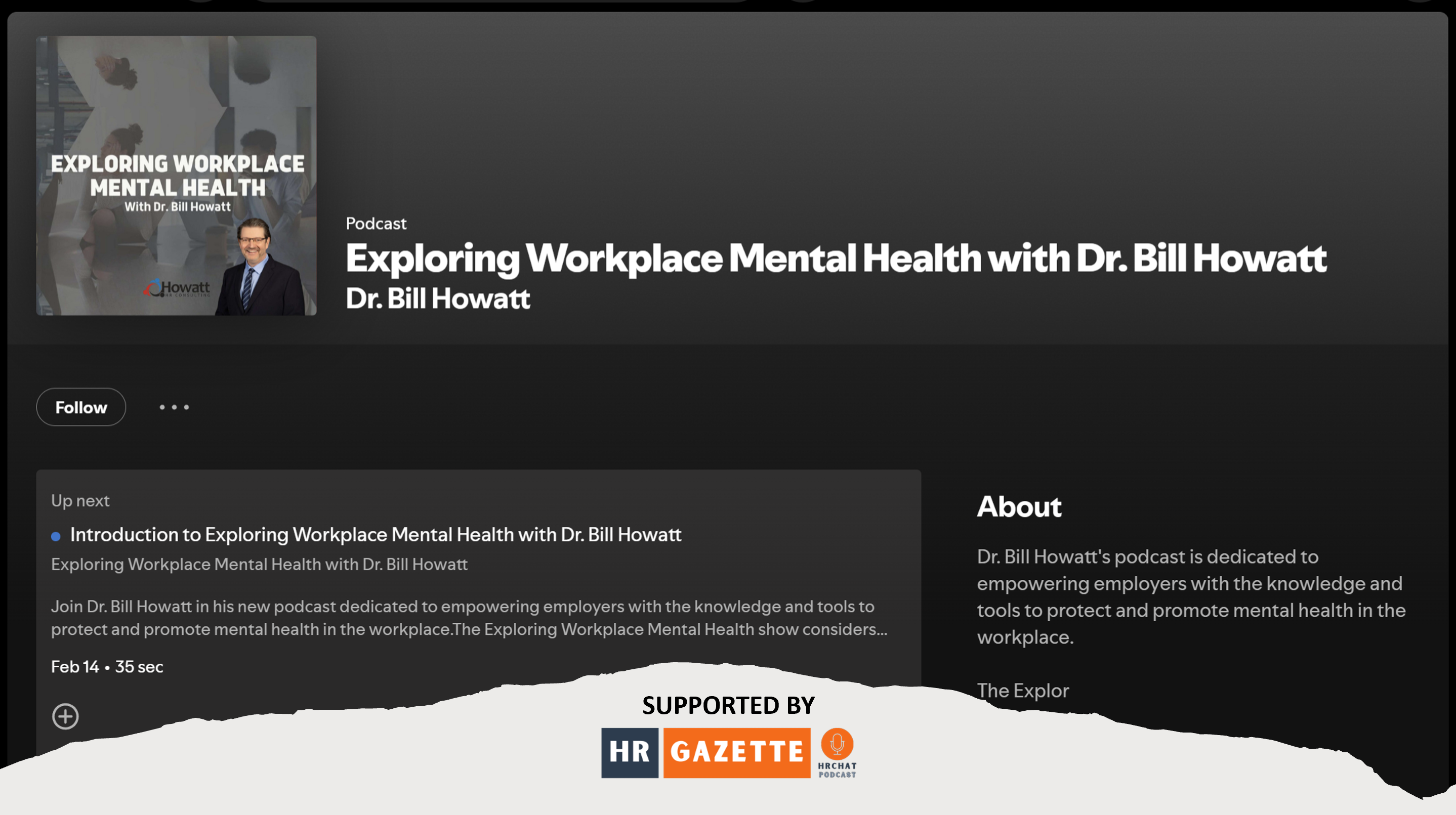
When it comes to workplace mental health crises, the question isn’t if they’ll happen – it’s when. As HR professionals and business leaders, we must accept that mental health challenges are part of the modern workplace and proactively prepare for them.
In the first episode of the new Exploring Workplace Mental Health Podcast, host Bill Banham sits down with Dr. Bill Howatt, a renowned expert in workplace mental health and crisis management, to discuss how organizations can build resilience and support employees before crises arise.

Why Every Organization Needs to Be Crisis-Ready
HR professionals are often the first line of support when employees experience mental health challenges. Unfortunately, many organizations lack the proper training, structures, and resources to handle these crises effectively. As Dr. Howatt explains, being unprepared can lead to increased absenteeism, presenteeism, and declining employee well-being – all of which negatively impact productivity, morale, and company culture.
Much like CPR training ensures people can respond to physical emergencies, mental health crisis preparedness equips HR teams and managers with the tools they need to navigate difficult situations. Having a structured approach to crisis management can mean the difference between a well-supported employee and a workplace disaster.
The Human Cost of Ignoring Workplace Crises
Dr. Howatt’s expertise is deeply personal. His journey—from lifeguard to HR consultant—has given him firsthand experience in managing high-stakes situations where quick thinking and emotional intelligence make all the difference. In his discussion with Bill Banham, he highlights the emotional toll crises can take on both employees and HR professionals, underscoring the importance of proactive support systems.
When an organization fails to address mental health concerns, the ripple effects are significant. Employees struggling with anxiety, depression, or burnout may continue working while disengaged (presenteeism) or take extended time off due to stress (absenteeism). Both scenarios contribute to lost productivity and increased turnover. Worse yet, a lack of crisis preparedness can lead to long-term reputational damage if an organization is perceived as neglecting employee well-being.
Key Skills for Managing Workplace Crises
So, what does it take to create a crisis-ready workplace? According to Dr. Howatt, HR professionals and leaders should develop these core skills:
- Emotional Regulation: Managing personal emotions during a crisis ensures clear-headed decision-making.
- Empathetic Communication: The ability to listen actively and provide support without judgment is crucial.
- Situational Awareness: Recognizing early warning signs of distress allows HR to intervene before issues escalate.
- Strategic Crisis Planning: Having a documented crisis response framework ensures consistency and preparedness.
- Collaboration with Experts: Partnering with mental health professionals can provide employees with the specialized support they need.
Creating a Culture of Preparedness
Crisis training should not be reserved for HR alone. Dr. Howatt emphasizes that every employee – regardless of role – should have access to training that helps them recognize signs of distress in themselves and others. Leaders, in particular, must set the tone by openly discussing mental health and encouraging employees to seek support when needed.
Practical tools, such as crisis checklists, mental health first aid training, and clearly defined support pathways, can empower organizations to navigate challenges with confidence. By embedding these strategies into company culture, businesses can create an environment where employees feel safe, supported, and equipped to handle the unexpected.
The Business Case for Crisis Readiness
Being prepared for workplace mental health crises is not just an ethical responsibility—it’s a strategic advantage. Organizations that prioritize mental health see improved employee engagement, stronger team dynamics, and higher retention rates. Moreover, when employees feel valued and supported, they are more likely to contribute positively to the organization’s success.
As Dr. Howatt shares in his conversation with Bill Banham, investing in crisis preparedness is about more than responding to emergencies—it’s about fostering a workplace where resilience is the norm, not the exception.
Final Thoughts
Mental health challenges in the workplace are inevitable, but organizations can mitigate their impact through proactive planning, training, and cultural change. By equipping HR professionals and business leaders with the right skills and resources, companies can create environments where employees feel safe, supported, and empowered—even in the face of crisis.
If you’re ready to take the next step in building a crisis-ready workplace, tune in to the podcast episode with Dr. Bill Howatt for deeper insights and actionable strategies.
